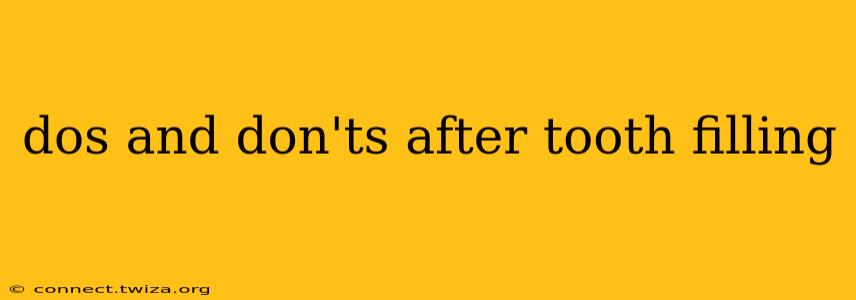Getting a tooth filling is a common dental procedure, but proper aftercare is crucial for ensuring a successful outcome and preventing complications. This guide outlines the essential dos and don'ts to follow after receiving a filling, helping you maintain optimal oral health.
What to Do After a Tooth Filling
Following these recommendations will significantly improve your chances of a smooth recovery and long-lasting filling:
1. Manage Pain and Swelling:
Many people experience some discomfort or mild swelling after a filling. Over-the-counter pain relievers like ibuprofen or acetaminophen can help manage any pain. Apply a cold compress to your cheek near the affected area to reduce swelling. This should be done in 20-minute intervals, with breaks in between to prevent skin damage.
2. Gentle Cleaning:
Begin gentle cleaning around the filling area as soon as the numbness wears off. Use a soft-bristled toothbrush and fluoride toothpaste. Avoid vigorous brushing or flossing directly on the filling for at least 24 hours to allow the filling material to properly set.
3. Monitor for Complications:
Pay close attention to the treated tooth and surrounding area. Contact your dentist immediately if you experience any severe pain, persistent swelling, increased sensitivity to hot or cold, or if you notice any signs of infection (such as pus or redness).
4. Maintain a Healthy Diet:
Stick to soft foods for the first 24-48 hours after the procedure to avoid putting unnecessary pressure on the filling. Gradually reintroduce your regular diet as tolerated, but avoid excessively hard or sticky foods that could dislodge or damage the filling.
5. Schedule Follow-up Appointments:
Your dentist will likely schedule a follow-up appointment to check on the healing process and ensure the filling is stable. Attending these appointments is critical for long-term oral health.
What Not to Do After a Tooth Filling
Avoiding these actions will minimize the risk of complications and prolong the life of your filling:
1. Avoid Excessive Pressure:
Refrain from chewing on the treated tooth excessively, especially during the initial healing period. Avoid hard candies, nuts, ice, and other hard foods that could put undue stress on the filling.
2. Don't Smoke:
Smoking hinders the healing process and can increase the risk of complications after a filling. Avoid smoking, or at least reduce your consumption, as much as possible.
3. Don't Neglect Oral Hygiene:
While gentle cleaning is important, neglecting proper oral hygiene is equally detrimental. Maintain a regular brushing and flossing routine, but avoid aggressive brushing near the filling for at least 24 hours.
4. Don't Ignore Symptoms:
Ignoring any unusual symptoms after a filling can lead to more serious issues. If you experience persistent pain, swelling, or other discomfort, contact your dentist immediately for evaluation.
5. Don't Consume Hot or Cold Drinks Immediately:
Immediately after a filling, the treated tooth might be sensitive to temperature changes. Gradually introduce hot and cold beverages and foods once the numbness has subsided.
How Long Does it Take for a Tooth Filling to Heal Completely?
The healing time varies, but most people experience complete healing within a few days to a week. However, the filling material itself is generally set within 24 hours.
What Happens if a Tooth Filling Falls Out?
If a filling falls out, contact your dentist immediately. Leaving a cavity unfilled can lead to further decay, infection, and more extensive dental work.
Can I Exercise After a Tooth Filling?
Generally, you can resume normal activities, including exercise, after a tooth filling. However, avoid strenuous activities that could cause jarring or impact to your jaw for the first few days.
By following these dos and don'ts, you can significantly improve the chances of a successful outcome and ensure your tooth filling lasts for many years. Remember, maintaining good oral hygiene and regular dental checkups are crucial for long-term oral health.
